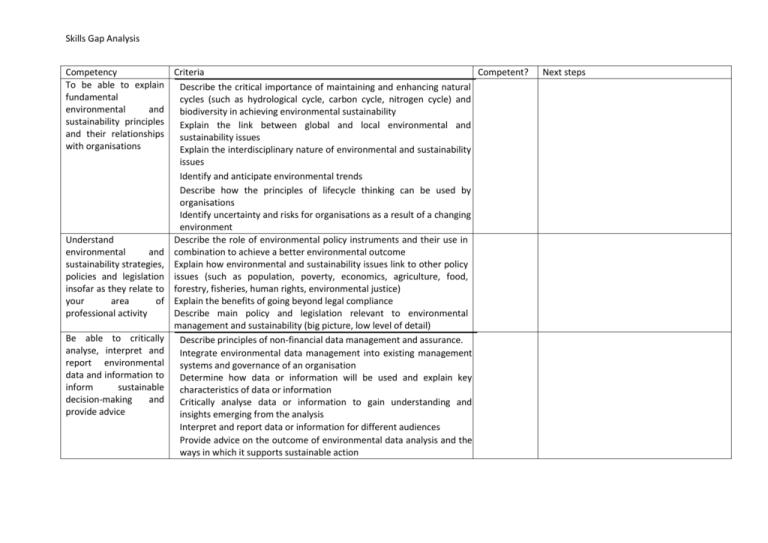Skills Gap Analysis Competency Criteria Competent? Next steps To
advertisement

Skills Gap Analysis Competency Criteria Competent? To be able to explain Describe the critical importance of maintaining and enhancing natural fundamental cycles (such as hydrological cycle, carbon cycle, nitrogen cycle) and environmental and biodiversity in achieving environmental sustainability sustainability principles Explain the link between global and local environmental and and their relationships sustainability issues with organisations Explain the interdisciplinary nature of environmental and sustainability issues Identify and anticipate environmental trends Describe how the principles of lifecycle thinking can be used by organisations Identify uncertainty and risks for organisations as a result of a changing environment Understand Describe the role of environmental policy instruments and their use in environmental and combination to achieve a better environmental outcome sustainability strategies, Explain how environmental and sustainability issues link to other policy policies and legislation issues (such as population, poverty, economics, agriculture, food, insofar as they relate to forestry, fisheries, human rights, environmental justice) your area of Explain the benefits of going beyond legal compliance professional activity Describe main policy and legislation relevant to environmental management and sustainability (big picture, low level of detail) Be able to critically Describe principles of non-financial data management and assurance. analyse, interpret and Integrate environmental data management into existing management report environmental systems and governance of an organisation data and information to Determine how data or information will be used and explain key inform sustainable characteristics of data or information decision-making and Critically analyse data or information to gain understanding and provide advice insights emerging from the analysis Interpret and report data or information for different audiences Provide advice on the outcome of environmental data analysis and the ways in which it supports sustainable action Next steps Skills Gap Analysis Identify and analyse problems and opportunities from an environmental perspective to develop and deliver sustainable solutions Use Communication to drive effective environmental and sustainable business practices Embed sustainable thinking in organisations insofar as it relates to your area of professional activity Outline environmental sustainability reporting standards and guidelines such as the types of reporting standards and guidance that are available and examples of each, with particular focus on those that are relevant to your role. Analyse short, medium and longer term environmental sustainability opportunities, trends and threats Evaluate environmental problems to develop practical sustainable solutions (improvements, mitigation, adaptation) Implement and evaluate environmentally sustainable solutions and recommend any further action Develop and le ad communication of environmental sustainability messages and initiatives in a manner which is professional and appropriate to the audience Identify, engage (2-way dialogue with stakeholders) and respond (listen and respond to stakeholders, tailoring the information to the audience) to stakeholder needs Explain and interpret the consequences of actions in respect to environmental sustainability damage and improvement Communicate the importance of global and local environmental sustainability issues and their interaction with an organisation Initiate and support actions that enable integration of lifecycle thinking into organisations Assimilate sustainable thoughts and ideas, act on them, implement them, build on them and/or apply them in a different context Identify the appropriate environmental management and/or assessment tools to use in a given situation (e.g. EMS, EMP, Footprinting, Environmental Impact Assessment, Strategic Environmental Assessment, Environmental Audit, Risk Assessment, Life Cycle Analysis) Know and understand and be able to implement one or more Skills Gap Analysis Manage and deliver environmental improvements and improve resilience (resilience of organisations, projects, developments, clients, etc) Educate, influence, persuade and challenge others to lead and promote sustainability environmental management and assessment tools Develop and communicate a sustainable business case (financial and non-financial) embedding effective environmental management Influence others to secure sustainable environmental improvements Integrate environmental issues and considerations into sustainable organisational planning and practice Set and monitor environmental objectives, targets and performance indicators (including benchmarking e.g. biodiversity benchmarking) Prepare, implement and monitor the effectiveness of a sustainable environmental performance improvement plan or action Identify strategic opportunities and risks (short, medium and long term) from a changing environment to organisations Identify and propose solutions to avoid or manage risks from a changing environment Advise and influence others to incorporate environmental sustainability considerations into decision making and actions Lead change and act with persistence to secure sustainable environmental improvement Promote an environmentally sustainable and resilient approach to planning and decision making Challenge and negotiate to encourage the inclusion of good environmental management and sustainability practice in decision making and subsequent action Constructively challenge behaviour that may cause environmental harm and lead to unsustainable outcomes








